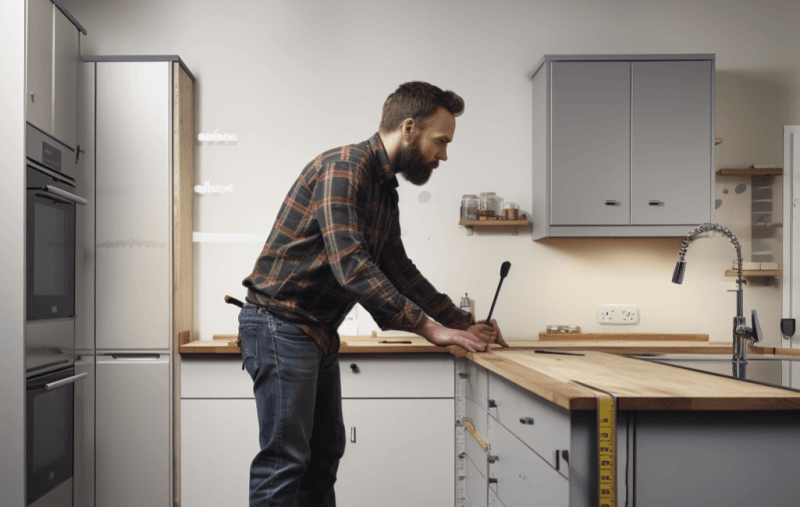When it comes to renovating your kitchen, the cost of fitting can be one of the biggest expenses. From the cost of kitchen units and appliances to the labor required for installation, there are many factors that contribute to the overall price tag. In this blog post, we’ll break down the typical costs associated with fitting a kitchen so you can budget accordingly for your project.
Kitchen Size and Complexity
One of the primary drivers of kitchen fitting costs is the size and complexity of your space. Larger kitchens will require more materials and labor, translating to higher overall costs. Additionally, kitchens with unique layouts, custom features, or extensive remodeling needs will be more expensive to fit than standard, straightforward designs.
As a general guideline, the average cost to fit a kitchen in the UK ranges from £1,500 for a small, basic installation up to £14,000 for a large, high-end kitchen. A typical 14 square meter kitchen falls somewhere in the middle, with an average installation cost of around £3,500.
Kitchen Units and Cabinets
Kitchen units and cabinets are a major expense, accounting for a significant portion of the overall fitting costs. The price of units can vary widely depending on the size, material, and design you choose.
For example, plain cupboard doors for a small galley kitchen may cost around £1,000, while premium Shaker-style cabinets for a large kitchen could be as much as £7,000. On average, you can expect to pay £40-£55 per cabinet for installation, with the process taking anywhere from 1 to 3 hours per unit depending on complexity.
Appliances
Appliances are another key consideration when budgeting for a kitchen fit. A complete set of kitchen appliances, including a freestanding oven, hob, dishwasher, fridge freezer, and sink, typically costs around £2,000. However, prices can range from as low as £500 for a basic package to over £5,000 for premium, high-end models.
Some common appliance costs include:
- Freestanding ovens: £210 to £2,700
- Built-in ovens: £300 to £1,500
- Hobs: £170 to £500
- Dishwashers: £500 to £1,000
- Sinks and taps: £120 to £1,200
- Fridge freezers: £450 to £1,800
Labor and Installation
The cost of labor is another significant factor in kitchen fitting expenses. Kitchen fitters typically charge by the day, with rates ranging from £200 to £240 for an 8-hour shift. This equates to around £25 to £30 per hour.
Keep in mind that kitchen fitters may need to subcontract electrical and plumbing work to other tradespeople, which will add to the overall labor costs. Additionally, if your kitchen requires extensive demolition or waste removal, such as hiring a skip, these expenses should be factored into your budget.
Are you interested? Arrange a consultation.
Additional Costs
Beyond the core elements of units, appliances, and labor, there are several additional costs to consider when fitting a kitchen:
- Worktops: Prices vary widely depending on material, with laminate starting at around £30 per square meter and quartz or granite costing £200-£300 per square meter.
- Flooring: New kitchen flooring can range from £10 to £50 per square meter, depending on the material.
- Tiling: Wall tiles typically cost £10 to £50 per square meter, with installation adding an additional £20 to £30 per square meter.
- Lighting: Pendant lights, under-cabinet lighting, and other fixtures can add several hundred pounds to your kitchen fitting costs.
- Decorating: Fresh paint, wallpaper, or other decorative finishes can cost £250 to £400 for a painter-decorator, plus the cost of materials.
Budgeting for Your Kitchen Fit
When budgeting for your kitchen fit, it’s essential to account for all potential expenses and leave room for unexpected costs. As a general rule, aim to allocate at least 10% of your total budget as a contingency.
To get an accurate estimate of your kitchen fitting costs, it’s recommended to obtain at least three fully itemized quotes from kitchen retailers, builders, or independent contractors. Be sure to clarify what each quote includes, such as the cost of units, appliances, labor, and any additional services like waste removal or decorating.
Remember, the cost to fit a kitchen can vary significantly depending on your specific needs and preferences. By understanding the typical costs associated with each element of a kitchen fit, you can make informed decisions and create a realistic budget for your project.
Are you interested? Arrange a consultation:
-
Why Professional Kitchen Fitting Is Worth the Investment
A kitchen is more than just a place to cook meals. It’s the heart of the home, where families gather, memories are made, and delicious aromas fill the…
admin
-
Avoiding Costly Mistakes: The Risks of Fitting Your Own Kitchen
Are you thinking about giving your kitchen a makeover? It’s an exciting project, but it can also be tricky. Many people consider fitting their own kitchen to save…
admin
-
Small Islands with Seating: Making the Most of Limited Space
Many homeowners dream of having a kitchen island, but worry their kitchen is too small. The good news is that even compact kitchens can often accommodate a small…
admin
-
Space-Saving Kitchen Islands: Creative Solutions for Small Kitchens
Are you dreaming of a kitchen island but worried your space is too small? Don’t give up hope! With some clever planning and creative design, even compact kitchens…
admin
-
Maximising Functionality: Small Kitchen Islands with Big Impact
Are you dreaming of a kitchen island but worried your space is too small? Don’t let a compact kitchen crush your culinary dreams! With clever design and smart…
admin
-
The Art of the Statement Kitchen Island: Making a Bold Design Choice
A well-designed kitchen island can transform your cooking space from ordinary to extraordinary. As the heart of the home, kitchens deserve special attention, and a statement island is…
admin






